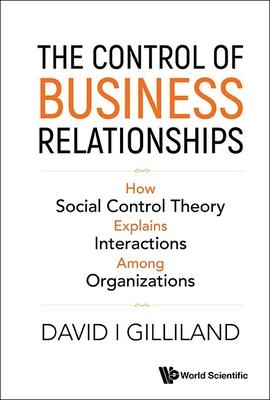How does social control theory explain the relationships between business firms and organizations? This book aims to answer that question. Providing a comprehensive organizing framework of control (1st, 2nd, and 3rd party control), this book focuses on informal and formal applications of control mechanisms such as contracts, monitoring mechanisms, incentives, and punishments. In doing so, it reviews existing control/governance theories such as transaction cost analysis, agency theory, power/dependence theory, contract theory, incentives theory and others. Social control theory is introduced as a meta-theory of governance and control. The derivation of control, the outcomes of control and, particularly, when and how control might be successful are discussed in detail.The book hypothesizes that the control mode and mechanisms in use are a function of the cost of control to the controller based on its desire to manage the relationship and its outcomes, and the target of control’s extent of agreement with the control processes in use. The various components of costs of control are identified and discussed. Drawing on interdisciplinary sources of information, it is a must-read for all who are interested in understanding the mechanisms of control and relationships underpinning business organizations.
| FindBook |
有 1 項符合
Control of Business Relationships, The: How Society Control Theory Explains Interactions Among Organizations的圖書 |
 |
Control of Business Relationships, The: How Society Control Theory Explains Interactions Among Organizations 作者:Gilliland 出版社:World Scientific Publishing Company 出版日期:2024-04-09 語言:英文 規格:精裝 / 220頁 / 普通級/ 初版 |
| 圖書館借閱 |
| 國家圖書館 | 全國圖書書目資訊網 | 國立公共資訊圖書館 | 電子書服務平台 | MetaCat 跨館整合查詢 |
| 臺北市立圖書館 | 新北市立圖書館 | 基隆市公共圖書館 | 桃園市立圖書館 | 新竹縣公共圖書館 |
| 苗栗縣立圖書館 | 臺中市立圖書館 | 彰化縣公共圖書館 | 南投縣文化局 | 雲林縣公共圖書館 |
| 嘉義縣圖書館 | 臺南市立圖書館 | 高雄市立圖書館 | 屏東縣公共圖書館 | 宜蘭縣公共圖書館 |
| 花蓮縣文化局 | 臺東縣文化處 |
|
|
圖書介紹 - 資料來源:博客來 評分:
圖書名稱:Control of Business Relationships, The: How Society Control Theory Explains Interactions Among Organizations
|











